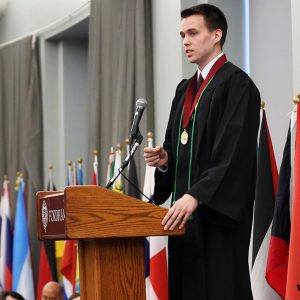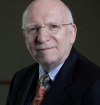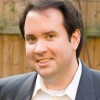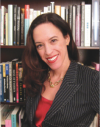
Donna Rapaccioli, Ph.D., dean of the Gabelli School (GABELLI), recalled gestures both large and small that helped her develop personally and professionally. Her grandmother, she said, always reserved a quiet space at her house for Rapaccioli to study, while cooking her nurturing meals.
“Her potato-and-egg omelets, Eggplant Rollatini, and Sunday gravy, which I ate all week, fueled my scholastic career,” she said.
When Rapaccioli was completing her dissertation and needed technical help on the computer, she said, her father, who never went to college, managed to find her a programmer—“and this was waaay before Google!”
The dean mentioned support and inspiration from two others: Associate Professor Frank Werner, Ph.D., one of her teachers, and the school’s benefactor Mario Gabelli, GABELLI ‘65, who often “peppered” her with questions, and took an interest in her career.
“If you’d told me 30 years ago that I’d have a billionaire mentor, I would have called you crazy,” she joked. “But he is a true supporter. Mario exemplifies giving back. And he reminds us that to envision the future, we must look to the contributions of young people.”
She encouraged the graduating class to “remember your helpers, aim high, and always be humble and kind.”
Class valedictorian John Witkowski recalled freshman orientation four years earlier, when he and his follow students were welcomed by Joseph M. McShane, S.J., president of Fordham. Father McShane, he said, told the students that they were the “smartest class to enter Fordham.” Witkowski said that the graduating class shouldn’t misconstrue the truth behind the remark.
The Smartest Class
“We shouldn’t have interpreted being called the ‘smartest class’ as an homage to our success—credit belongs to the classes who had come before us,” he said. “It was their work that transformed Fordham over the years and convinced us to enroll.”

He then congratulated his fellow classmates on contributing to the legacy, and welcomed the next “smartest class.”
The Alumna of the Year award went to Christine Lowney, GABELLI ’98, partner at Ernst & Young. Lowney said that even though commencement weekend was a time for looking forward, students should carve out time in their future to come back and contribute to the school’s legacy.
“You as alumni can now play an active role in supporting your alma mater; I would dare to say you have an obligation,” she said.
In addition to recognizing student achievements, the awards event also celebrated faculty contributions. The Dean’s Award for Teaching Excellence for full-time faculty went to Kevin Mirabile, D.P.S., clinical assistant professor; the Dean’s Award for Teaching Excellence for adjunct faculty went to Joe Lizza; the Faculty Cura Personalis Award went to Clarence Ball, clinical assistant professor; and the Faculty Magis Award went to Mario DiFiore, the assistant dean for seniors.
]]>
Oil Prices & Airline Profits: A big story in 2015 will be the continued fall in the price of oil. Brent crude, $115/barrel in June 2014, is now down to $60 and will likely fall to around $50 next year. The impact is perhaps most visible at the pump where gasoline is now below $2/gallon in some parts of the country. The effect on the U.S. economy has been a stimulus far more effective than any that government could provide: reduced production costs for businesses and significantly greater disposable income for consumers. One major beneficiary will be the airline industry. Fuel accounts for 25-30 percent of airline costs, the industry’s single biggest expense. Lower oil prices will add over $6 billion to airline profits worldwide in 2015. However, fares are unlikely to decline on most routes since the airlines are already filling their planes and have little incentive to discount prices to sell the remaining seats.
-Frank Werner, associate professor of finance and business economics
Net Neutrality No, Faster Streaming Yes

Net Neutrality No: The big social media development in 2015 will be the increase in original television watched by streaming, adding to the success of House of Cards, Orange is the New Black, Marco Polo, and The Peaky Blinders on Netflix and Alpha House on Amazon. Viewing unique to smart phones, tablets, laptops, and smart television will continue to compete with and supplant traditional cable and network offerings. Net neutrality won’t be enacted, insuring even faster streaming and better viewing for millions of consumers.
-Paul Levinson, professor of communication and media studies

Human Rights: What we have witnessed during the latter half of this year is a revolutionary transformation in the way we think and act in regard to race-based injustice. I hesitate to call the protests, actions, and community mobilizations that have occurred in response to Mike Brown’s murder in Ferguson and Eric Garner’s death in Staten Island “trends”. As a young woman activist recently told me, “Mike Brown is the catalyst and Ferguson the site” that highlights the pervasive nature in the United States of state violence against people of color (who are usually black and poor), and an enduring anti-black ideology. People of all class and race backgrounds have come together to call out these inhumane practices. This is a new movement. This is a human rights issue, not a matter of partisan politics. We will see this movement for justice continue into 2015 and beyond. And, it will be largely led by the courageous and smart organizing of black youth who refuse to be silenced or see anyone refused his or her full rights of citizenship.
-Aimee Meredith Cox, assistant professor of African and African-American Studies
Pope Francis in the Land of the Free

A Papal Appeal: This coming Earth Day (April 22nd) Pope Francis will release a much-anticipated encyclical on ecology. I suspect his visit to the United States, which comes only five months later, will focus on ideas from that document. My sense is that he will call Americans–especially given our status as trend setters when it comes to the world’s economy–to radically rethink our consumerist lifestyles and addiction to technology. These twin forces are destroying both the world’s ecology and what the Pope will refer to as “human ecology.” For decades, Catholic social teaching has connected the health of the human heart or spirit with the health of the earth. I anticipate that the Pope will call on Americans to resist the disconnected lifestyle that consumerism and technology produce, and instead live a life concerned with and connected to the health and flourishing of those in need and, indeed, of the whole planet.”
-Charles Camosy, associate professor of theology
Apple Watch Drives Wearable Tech

Design and Tech: Fashion and fashion law are all about trends, and 2015 will be no exception. The wearable tech sector will continue to grow, generating a steady stream of patent applications and licensing deals between designers and tech companies, and the expected release of the Apple watch is likely to boost interest still further. Data privacy problems will remain critical for online retailers and are on the horizon for wearable tech companies as well. And social issues, from environmental sustainability and working conditions to gender-specific workplace dress codes to ruffled feathers over Native American headdresses and other forms of cultural appropriation, will continue to be topics of conversation. In other news, following a recent legal settlement, New York Fashion Week will leave Lincoln Center after February. Enjoy the spectacle now!
-Susan Scafidi, academic director for the Fashion Law Institute
The Supreme Court has a Big Decision to Make

A Presidential Legacy: In the spring of 2015 the Supreme Court will hear another challenge to the Affordable Care Act (ACA). The judicial question revolves around the extension of federal subsidies to individuals in the 36 states that have not established health care exchanges. Plaintiffs argue that the government avoided establishing federal exchanges in the ACA, encouraging individual states to establish them instead. Contrarily, the government argues it intended to establish federal exchanges, but still encouraged states to join them in doing so. As a result, the Court has a serious decision to make. It could deconstruct the signature piece of legislation passed by the executive and legislative branches in the last six years, which would likely cement itself to critics as a politicized institution and not an objective appellate judiciary. It could also refrain from any decision with major impact. As the Obama Presidency draws to a close, a decision on this case could significantly affect his legacy.
– Bobby James DeNault, FCRH 2016, political science major
Restorative Justice and Transformative Power

Fixing What’s Broken: Next year we’re going to see much needed attention on restorative justice that focuses less on punishment and more on repairing harm for all involved because of crime. Fordham collaborated on an exceptional restorative justice consultation in November 2013 that brought leadership in the faith community and justice officials together with leaders from around the world who have experienced restorative justice’s transformative power. Everyone there agreed that the U.S. justice system is broken, particularly for people of color. We are inhumane with the way we handle justice. Right now the Beck Institute is working with judges, lawyers, social services and congregations in Westchester who have committed themselves to doing something about this. Currently there isn’t a program of restorative justice in the county; a tragic omission, particularly for youth. Judge George McKinnis has provided the leadership, establishing a 501c3 for Community Restorative Justice.”
-Anita Lightburn, professor of social work and director, Beck Institute on Religion and Poverty
— Janet Sassi
]]>
On Sept. 3, more than 500 Gabelli freshmen gathered on the Rose Hill campus to receive words of wisdom from journalist David Bornstein, whose book How to Change the World: Social Entrepreneurs and the Power of New Ideas (Oxford University Press, 2007) was required summer reading.
The book is a collection of case studies about social innovators such as Jody Williams, whose international campaign against landmines won a Nobel Peace Prize, and Diana Propper, who used investment banking techniques to make American corporations environmentally responsible.
But Bornstein, author of The New York Times’ Fixes blog and founder of the social innovation news site dowser.org, said that he has come to realize that many potential innovators forgo their aspirations because they simply don’t know where to begin.
He recalled asking students at a Midwest college to list every social problem they could think of, and then list every possible solution to those problems. The students were able to fill a blackboard with problems, yet were unable to devise more than a few solutions.
“How could you go through four years of college but only have been exposed to four or five solutions to the 100 problems in your head?” Bornstein said. “What does that do to your energy and your motivation? You have so much awareness about the problems, yet so little awareness about what can be done to solve them.”
Bornstein advised freshmen to spend their time “half on criticality, and half on hope.” If, as brand new students, they committed to pursue solutions as well as problems, then they would be well-poised to effect major social changes by the end of their time at Fordham.
He also emphasized that the ability to make social impact is not limited to people with wealth or status. All it takes is finding the right niche.
“It’s misleading to think that to start social change you have to start your own company,” Bornstein said. “There’s a role for ‘intrapreneurs’ — people who go into hospitals, large companies, or corporations, and change them from within.”
Bornstein said that major social change happens at the intersection of three elements:
- Who you are (What interests you? What bothers you? What kind of work gives you energy rather than drains you of it?)
- Where there is urgent need
- Where opportunities to start solving those needs exist
Once you reach that intersection, he said, take risks and maintain a “pitbull-like tenacity.”
“I encourage you to fail—a lot,” Bornstein said. “Know that failure is the most normal part of this process of social entrepreneurship. It’s a sign that you are doing the right thing.”
Joining Bornstein on a panel following the talk were Frank Werner, Ph.D., associate professor of finance and business economics, Michael Pirson, Ph.D., associate professor of management systems, and Michèle Leaman, changemaker campus director for Ashoka U, an initiative of the international social entrepreneur network, Ashoka.
During the event, Leaman presented a plaque to members of the Gabelli School to officially recognize Fordham University as one of Ashoka’s 25 “changemaker campuses” working to change the world through social innovation.
The conversation about social entrepreneurship and innovation will continue on Sept. 9 at the celebration of the Loschert Endowed Chair in Entrepreneurship. The event will feature Midwest Social Innovation LLC founder Jeff Snell, Ph.D., who led fellow Jesuit school Marquette University to become one of the first ten changemaker campuses.
Contact: Joanna Mercuri
(212) 636-71715
[email protected]
Sickles, who earned an MBA from Northwestern University after graduating from Fordham with a degree in marketing and management, will speak at 9:30 a.m. in the McGinley Center Ballroom.
In his current position, he is responsible for developing Google’s global relationships with a select group of consumer product’s companies. Previously, he spent three years as head of healthcare at Google, focused on providing solutions for healthcare and pharmaceutical companies, and a year in sales management with Google Audio.
After Sickles’ talk, Frank Werner, Ph.D., associate professor of finance and economics will review the students’ summer reading assignment, The Google Story (Delacorte Press, 2005). The students then will break into groups to discuss potential business proposals.
—Patrick Verel
]]>
Photo by Gina Vergel
In the world of finance, as in many disciplines, success comes to those who know how to capitalize on emerging trends in the field, according to Frank Werner, Ph.D., associate professor of finance.
In the late 1980s, Werner and his colleague Jim Stoner, Ph.D., professor of management systems, were at the forefront of research that pierced the symbiotic relationship between management and finance. The textbook that grew out of their partnership, Modern Financial Managing: Continuity and Change(Freeload Press, 2007), is now in its third edition.
Today, Werner sees the business world changing again, and a new book is in the works. The Amazing Journey of Adam Smith is a novel that espouses Werner’s ideas about the responsibility of corporations to the environment.
“I started thinking a lot about environmental responsibility on the individual level. Then I transferred that to sustainability as it relates to the goals of a firm,” he said. “If the goal of a firm remains maximizing shareholder value, does that permit a firm to motivate its people to act in sustainable ways?
“The answer starts out as ‘maybe,’ then it goes to ‘yes’ in some cases and ‘no’ in others,” he said. “The ‘yes’ part is that we are starting to discover environmentally friendly products and services that are quite profitable. The ‘no’ part is that when faced with the choice of making money or helping the environment, making money will win out almost every time.”
The balance between profit and sustainability explains why new buildings tend to be certified gold or silver by the Leadership in Energy and Environmental Design (LEED) Green Building Rating System, but rarely platinum, which is the rating system’s highest standard, and also its most expensive.
“We’re seeing things like wind and solar power in businesses that are trying to become more energy efficient. Automobile companies are moving toward more environmentally friendly propulsion systems and moving away from fossil fuels,” Werner said.
“In the airline industry, General Electric is developing more environmentally friendly airplane engines that use less carbon-based fuel. But you are also seeing industries saying, ‘We’re going to go out of business if we have to follow those standards.’”
Werner said it is time for businesses to place environmental and social justice concerns on par with profits.
“I have made presentations on whether finance theory is valid today if it makes economic sense but doesn’t make social or environmental sense,” he said. “We need to enter a new paradigm for businesses that moves away from solely a financial focus to a much broader focus on the needs of the world.”
Werner said he opted to express his ideas in a novel instead of a research paper because finance research journals still are oriented to the existing economic-value-only paradigm.
“The theme of the book is based on how the goals of a firm need to change to be consistent with sustainability,” he said.
In The Amazing Journey of Adam Smith, the title character is the revered 18th-century economist who is considered the father of capitalism.
“Smith believed that when a individual pursues his self-interest, he promotes the good of society more than if he intends to benefit society,” Werner said. “He was talking about the emerging Industrial Revolution companies, and the benefit to society he was talking about was economic. He was absolutely right about that in his environment—in his world.”
Today, Werner said, while the economics of a business matter, a firm will only thrive in the long term if it focuses on aspects beyond a favorable profit and loss statement.
“The business of the future must contribute in three arenas. One is economic, another is environmental and the third is the social justice dimension,” he said. “There are three billion people around the world living in poverty. We can’t live in a world of the ‘haves’ and ‘have-nots’ where, thanks to the Internet and satellite television, the two groups can see how the other is doing.
“Some argue that this phenomenon has contributed to terrorism,” Werner continued. “Religious fanaticism plays a role, but when you have part of the world living as Americans do, and poor people in Third World countries can see that, it does cause anger.”
Today, Werner said, the financial paradigm is to increase shareholder value, and perhaps contribute to ecological and social issues to the extent it doesn’t impair that value.
“I see finance as having to adapt to this new world, or businesses won’t survive,” Werner said. “Look at the American automobile industry. It used to be that you bought American because that was your only choice. Then foreign manufacturers, particularly the Japanese companies, discovered quality management and the American companies found themselves scrambling to catch up.
“Now the game has changed again. Consumers are demandingenvironmentally friendly cars, like the Toyota Prius,” he said. “The survivors in the industry will be those companies that learn to compete and be profitable by making environmentally friendly vehicles.”
]]>